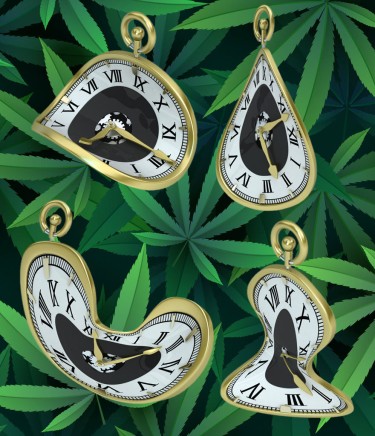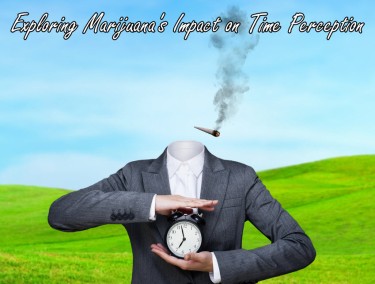
Think back to early February when you might have heard about a group of mail carriers in Clapham. They got into trouble during their work shift because they accidentally ate some brownies with drugs in them.
In a viral video, one person said they felt like they were walking forever while delivering mail. If you’ve ever used cannabis, you probably know how it can mess with your mind and make time feel strange, mainly if you use it too much. Have you ever been so high that you started questioning if time is real for humans?
People often talk about how using cannabis can make time feel distorted, but why does this happen exactly?
Exploring the Link Between Cannabis and Time Distortion: Historical Insights
In 1846, French physician Jacques-Joseph Moreau delved into the impact of cannabis on artists who consumed hashish. His observations, detailed in the publication “Hashish and Mental Illness: Psychological Studies,” revealed that hashish led to “errors of time and space” and a sense of “time dragging.”
Many cannabis users can relate to the sensation of time coming to a sudden halt when the high sets in. Seconds may stretch into minutes, which can feel like hours. Checking the clock might reveal that what seemed like half an hour was only ten minutes.
In recent times, researchers have aimed to unravel the effects of cannabis on time perception. Multiple studies have been conducted, and a 2012 review in Current Pharmaceutical Design examined existing literature.
The review found that “70% of time estimation studies report overestimation,” indicating that cannabis users often feel more time has passed than it has. This phenomenon, commonly called time dilation, involves the perception that time is moving slower.
Nevertheless, existing studies on the effects of cannabis on time perception have faced methodological limitations, leaving the precise impact inconclusive. To overcome these shortcomings, researchers adopted a randomized, double-blind, placebo-controlled approach, considered the “gold standard” in experimental design.
Forty-four participants received injections of THC, the mind-altering compound in cannabis, at doses ranging from 0.015 mg/kg to 0.05 mg/kg or a placebo. Before and after drug administration, participants engaged in various time-related tasks, estimating elapsed time or producing a specific duration.
The findings, published in Psychopharmacology in 2014, revealed that a psychoactive dose led to the overestimation and underproduction of time, indicating the presence of time dilation. Interestingly, the severity of these effects did not align with the administered dose, introducing further complexity to the relationship between cannabis and time perception.
Understanding Time Perception: The Role of THC in the Brain
Contrary to directly slowing down time, THC (the active compound in cannabis) seems to influence our internal clock, causing our subjective sense of time to pass more slowly than objective time. While the exact mechanism remains unclear, a hypothetical explanation has been proposed.
Certain researchers suggest that cannabis influences our time perception by interacting with the thalamic-corticostriatal circuit in the brain. Previous studies have highlighted the importance of this circuit in cognitive control, including the perception of time, and the brain areas within it are densely populated with cannabinoid receptors.
Cannabinoid receptors, forming the endocannabinoid system (ECS) throughout the brain and body, are crucial for coordinating various biological processes. The theory posits that when cannabis is consumed, THC enters the brain and binds to these receptors, disrupting the activity of the thalamic-corticostriatal circuit. This disruption is responsible for distorting our perception of time.
This notion is further supported by the fact that smoking cannabis results in a higher sense of time dilation than taking cannabis edibles. This is because inhaling cannabis causes THC levels to peak sooner, resulting in a more potent cannabinoid flush in the brain.
In a similar vein, the previously noted 2014 study discovered that those who smoked cannabis two to three times a week or more had “blunted THC’s time-altering effects.” Hence, it is believed that regular cannabis users grow accustomed to these perceptual effects but not to the euphoric effects of THC.
Despite this tenable idea, there hasn’t been much research done on how cannabis affects time perception, and the results are still primarily equivocal. While it is well-accepted that THC produces time dilation, the extent and the underlying mechanisms of this effect still need to be understood.
Eventually, cutting-edge neuroimaging methods should enable scientists to determine precisely how cannabis chemicals affect these timekeeping brain circuitry.
Cognitive Function is Influenced by Changes in Time Perception.
Fundamentally, timing matters. It is essential to all actions, behaviours, and cognitive processes. And when we can’t schedule ourselves precisely, everything that makes normal functioning possible becomes thrown off.
Even though these time-slowing effects can seem like a drawback, there are many ways in which they could be advantageous to the user—especially in the creative industry.
It is well acknowledged that the mind-altering properties of the cannabis plant influenced the early 20th-century jazz movement. Jazz artists could play with rhythms and rhythm by warping their timekeeping, which led to expressive melodies that quickly became recognized as the genre’s signature.
In a similar vein, cannabis is frequently promoted as a tool to improve creativity by artists. Specifically, time dilation can help artists slow down and become more in tune with their work, fostering creativity.
Time dilation can be a big assistance for people who have trouble living in the moment, even cannabis users who aren’t artistic. You’re probably more aware of the present moment and, possibly, have a deeper appreciation for your immediate surroundings and current location when you have a slower sense of time. This could be very helpful for anyone who needs a little help with their mindfulness and meditation practices.
Still, having a distorted sense of time is not always pleasant. Some people may find this sensation quite disturbing, and it could even make them feel anxious or panicked. Lead researcher for the 2014 study and Yale psychiatry professor Deepak D’Souza expressed his curiosity at the finding that “in certain individuals who…experienced time dilation, the overall experience was even more unpleasant.”
A specific memory that comes to mind is of a friend who was suffering from the effects of a potent space cake and said, “I think it might be time travel…or the end of my life.” For some people, the benefits of cannabis can be the best way to relieve stress. However, as others are aware, the plant’s time-bending properties aren’t suitable for everyone.
CANNABIS DISTORTS TIME, READ ON…
HOW CANNABIS CHANGES YOUR PERCEPTION OF TIME IN THE BRAIN!
- SEO Powered Content & PR Distribution. Get Amplified Today.
- PlatoData.Network Vertical Generative Ai. Empower Yourself. Access Here.
- PlatoAiStream. Web3 Intelligence. Knowledge Amplified. Access Here.
- PlatoESG. Carbon, CleanTech, Energy, Environment, Solar, Waste Management. Access Here.
- PlatoHealth. Biotech and Clinical Trials Intelligence. Access Here.
- Source: http://cannabis.net/blog/medical/why-does-time-seem-to-stand-still-when-you-are-high-how-cannabis-effects-your-perception-of-tim




